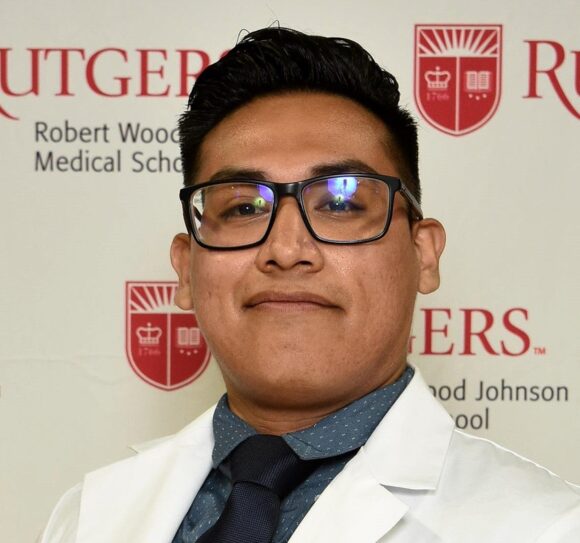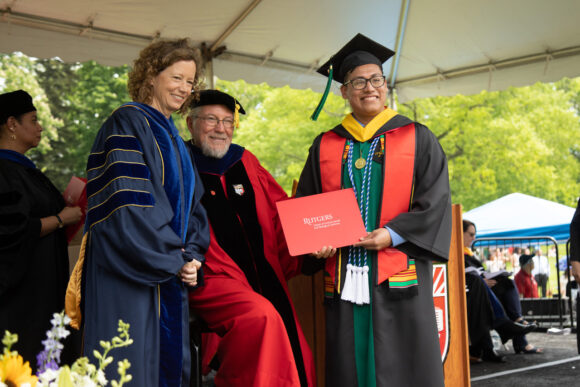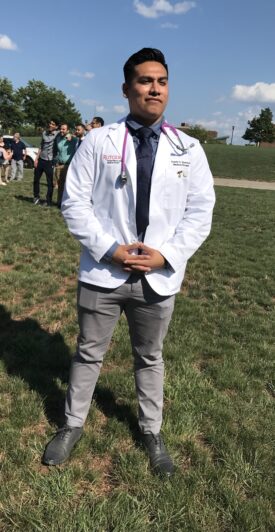
Kevin Guerrero, first-year medical student at RWJMS.
Kevin Guerrero (SEBS’19, Exercise Science) is a first-year medical student at Rutgers Robert Wood Johnson Medical School, who was born in North Bergen but raised in West New York, NJ. Although born in the U.S., he considers his upbringing as having always been heavily influenced by his Mexican and Latinx culture. Both of his parents emigrated from Mexico in their young adulthood to seek the American Dream and to leave behind the deep poverty in which they lived.
“Everything they have sacrificed and endured to allow myself and my sister to experience and enjoy is a privilege I hold dear to me. In the same regard, they always pushed education first and the pursuit of a career that can allow myself to provide for my future family.”
It mattered greatly to him, a first-generation Mexican American, to pursue that ideal of higher education as the path to a better life and it felt even more so, as the first born in his family.
“I held the forefront responsibility of my family and ancestors who couldn’t accomplish an education to be the first to rightfully do so. When I received the letter of acceptance from Rutgers in 2015 illustrating the culmination of tremendous hard work and perseverance in high school, I was able to accomplish something historic.”

SEBS EOF Graduate Kevin Guerrero (SEBS’19) pictured at Convocation with then Dean of Academic Programs Laura Lawson and then SEBS Executive Dean Robert M. Goodman. Photo: John O’Boyle.
But the path to college, much less medical school, was hardly assured. He grew up playing soccer but this was no mere hobby for Kevin. He had aspirations of becoming a professional player.
“The sport is part of my identity and I learned values of discipline, hard work, courage, leadership, and many others through the many years of training. I once had a dream of becoming a professional soccer player. Just like most enthusiastic young children, there was a dream of playing in a full stadium with the crowd roaring and cheering and the lights shining on top of you. People would line up for an autograph and you would give back to your community and provide everything for your family. On paper, the dream seemed beautiful.”
It wasn’t until the end of his sophomore year that he decided to step away from this dream and pursue a career in medicine. He continued to play soccer during college through the soccer club and intramurals. He still plays the sport today, but, as he says, “enough to maintain it as a hobby and to strengthen my health and values.”
Kevin credits his resiliency in college to the strong network of advisors with whom he interacted at SEBS Educational Opportunity Fund (EOF) as well as the support afforded students like him who wish to pursue biomedical careers at Rutgers. In this journey to medical school, Kevin strengthened his credentials with a master’s degree in Biotechnology from Johns Hopkins University in 2020.
He agreed to share firsthand his journey to medical school with SEBS/NJAES Newsroom. His story serves as an inspiration for Latinx and other graduates of SEBS.
Why did you choose SEBS?
I knew Rutgers had tremendous quality in education, resources, and opportunities. There were many schools within Rutgers to choose from. Yet, one factor that made me choose SEBS was the decision to study biochemistry. My high school chemistry teacher suggested that I choose a major that encompasses the subjects that I did well in. The subjects were biology and chemistry. I then thought combining the two subjects would be interesting. I looked up what science would combine both subjects and, well, I found biochemistry. In the end, of course, I did not graduate with a major in biochemistry. I later realized that biochemistry was not my passion, and I was just pursuing something that did not make me enjoy my higher education. This was a good lesson I learned about pursuing your passions regardless of the circumstances. Anyway, I knew I did not want to go into a PharmD program or go into SAS. The main factor that influenced me to choose SEBS over any other school in Rutgers or other institutions, was EOF. I did not know much about EOF, but what I did know was that SEBS EOF had rigorous counseling, guidance, and resource pathways that allowed the student to excel. I was but a first-generation kid with the dream of achieving greatness and I chose SEBS EOF to be the place where I could nourish myself with the tools necessary to accomplish that dream. I was not wrong.

Kevin Guerrero, currently a first-year medical student, pictured following his white coat ceremony.
How did your background and interests influence your decision?
One essential factor that has influenced me as much as my Mexican culture is soccer, which taught me values that I have developed, strengthened, and utilize today. I was a very competitive athlete with strong interests in learning about methods to improve training and learning about human anatomy. This was my passion, and this coincided with the emerging field of study, exercise science. I made the decision to switch majors and completely commit to this area of focus. I never looked back and through the help of the Department of Kinesiology, I met fantastic professors, and gained substantial experiences including shadowing an orthopedic surgeon, and being a student trainer for the D1 Men’s soccer team.
How would you describe your SEBS experience?
In one of the first talks that Dr. Jacqueline Moore [assistant dean and director, SEBS EOF] gave to my group before the start of the Summer START UP, she spoke about the level of professionalism, academic rigor, and courage required to graduate. I felt a little intimidated and I thought to myself, do I really want to continue and stay in this track? Despite these slight doubts, I was fueled by an enormous amount of motivation and enthusiasm. Whatever doubts I had were flushed away with the confidence in knowing I belong here and I am worthy of graduating. Within the first week of the summer program, I felt a mental exhaustion that I never felt before. I clearly remember returning home from the first weekend of the program and immediately falling asleep for an entire day. The program was intense, but extremely fun and exciting. I met my counselor, Zuri Obado, whose mentorship has guided me to reach places I could only dream of. I developed friendships and connections that I continue to nurture to this day.
Were you able to participate in meaningful research as an undergraduate, and if so, how has that impacted you?
My very first experience in a lab was provided by the SEBS EOF SOLID GEMS Biology House. It was a Friday morning in a plant biology laboratory, where I shadowed a graduate student for a couple of hours and got a taste of research. I did not know anything about plants or fungi, but I was very curious and engaged. I ran a PCR for the first time and learned about DNA replication and amplification. I knew at that moment that I wanted to practice research and maybe one day have my own lab. This growing interest in research led me to apply and be accepted in the RISE IMSD-Pipeline Program at Rutgers for a summer research project during the summer entering my junior year. It was my first time having a mentor teach me specific biochemical techniques and understand scientific topics necessary to becoming a well-equipped and skilled researcher.
As you look back at the challenges, what were some of the tools you employed to stay focused?
There is so much to say about the challenges I faced throughout my path in higher education. I had socioeconomic problems that slowed my ability to learn, and I struggled through a personal dilemma between deciding medicine or a career in soccer in college. I grew up in a low-income community and most of the families were composed of immigrant parents with their first-generation children. The environment was not the best or healthiest. There was a high crime rate, high gang activity, and high usage of drugs within my own age group. I can honestly say, I was close to being involved in these negative life choices. I don’t quite remember the decision I made that helped me stay on track, but whatever it may have been, I am happy I did so. I do not know where I would be if I followed through with those negative influences. I also had to grow up knowing that there are individuals that are racist or discriminatory towards my people. My mother would often find herself being attacked by people of white skin color for not being able to speak English or for being Mexican and stealing their jobs. It wasn’t very pleasant to hear her talk about it. However, this was the reality I lived in, and I couldn’t change anything about it. The only thing I could do was to make the decisions that would either help me succeed or make me fall. I always thank my family, close friends, and the sport of soccer for keeping me in check and allowing me to stay focused. Yet, I will never forget my upbringing because I am who I am through the experiences of my childhood and adolescence.
What motivated you to enroll in medical school?
I remember several times as a child I had to be a translator for my parents during their medical appointments. It was a scary thing because I had no idea what the doctor would be saying, and I would have the responsibility of letting my mother know that her blood pressure was low. I was also curious to figure out that many of my mother’s physicians did not speak Spanish despite being in a community that is predominantly Hispanic and Spanish-speaking. I found that quite interesting. Once I entered college, I was introduced to social determinants of health and how these factors affect the health of a minority population. I began to formulate an idea of how these factors affected me and my family. I told myself that I want to be the change, someone who can advocate for my people, and who can provide equitable healthcare. My decision to pursue medicine was only reinforced even further through the outcomes of the COVID-19 pandemic. I experienced first-hand the disparities and gaps in healthcare in our country. I will also say that the career of a physician fits rather well with my personality and values of hard work, discipline, and service. Medicine is my passion and I pursue this career to become the person that has the tools to change the face of healthcare.
It’s early yet, but any thoughts about your future as a doctor?
Now that I have achieved something that many only see as a dream, the opportunities are endless. I will continue to work towards my objective of gaining the right tools to become the change in my community. I am in the process of joining several interest groups regarding integrative medicine, orthopedics, surgery, Spanish medicine, medical genetics, and diversity and inclusion. It may sound like a lot, but I joined these groups with the intention of becoming the best physician I can possibly become. I will hold the responsibility of providing high quality equitable care to every population. Therefore, I study not to pass exams, although that is important, but rather to prepare myself to become a physician. Becoming a physician is perhaps one of the most rewarding careers, and I am humbled and honored to be in this path. Each and every day, I work relentlessly to become the best version of myself. I look forward to what may come next.
Meet other SEBS alumni as we celebrate Hispanic Heritage Month.

